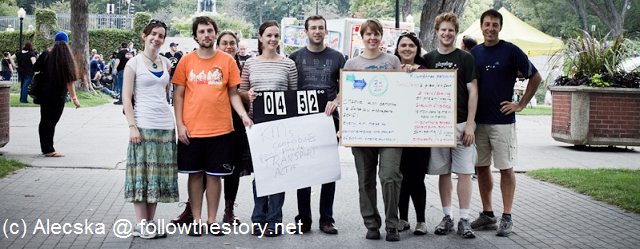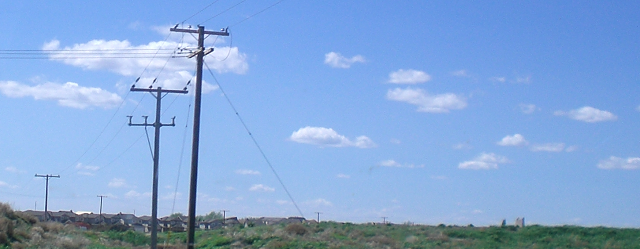Preface This document is a response to the draft documents posted as part of the Design Regina process. The authors of this response are also the primary authors of Transforming Regina: Planning for 2040 and beyond, which achieved a place in the finals of the Regina Morph My City competition. Readers interested in a detailed […]
Tag: Health
Harvest and Hunger: Amy Jo Ehman on local food choices
Hello! This is my first post on Vision of Earth. Glad to be here. On November 9th & 10th, SCIC (Saskatchewan Council for International Cooperation) hosted an event in Saskatoon called Harvest and Hunger (introduced in our earlier post: Harvest and Hunger: Brainstorming the future of the world food system). SCIC is an umbrella organization that represents […]
Harvest and Hunger: Brainstorming the future of the world food system
Harvest and Hunger The Saskatchewan Council for International Cooperation is hosting an event in Saskatoon on November 10th called Harvest and Hunger. The event sets out to answer three questions: Who controls the world’s food? Who has power in the global food system? Who doesn’t? What are people doing – both in Saskatchewan and around […]
Moving Planet Montreal video by Developing Pictures
A wonderful video about Moving Planet Montreal was created by Alex Pritz of Developing Pictures. The video features Ben Harack in his first-ever YouTube appearance!

Moving Planet Montreal
Moving Planet Montreal was a celebration of the transition away from fossil fuels in our society. The event was a green kilometer drive and a grand picnic, symbolizing the central role of transportation and food in sustainability.
Envisioning a Green Life: 10 ways you can make a difference
Simple, practical advice on how to live a green life. Based on years of research and thought on the matter by the Vision of Earth team.
How much would it cost to end extreme poverty in the world?
Ending extreme poverty in twenty years is very feasible if the developed world delivers on their promises. The United States alone could end world poverty with a fraction of their military budget.

Opportunities and perils of natural gas usage on the road to renewables
Our increasing reliance on natural gas brings with it both opportunities and dangers during the shift towards renewable energy. This issue deals with some major issues regarding natural gas deployment in industry, power generation, food production, and heating.
John Klein: Social involvement and sustainability in Regina, Saskatchewan, and Canada
John Klein is a notable blogger and community activist in Regina, Saskatchewan. Here he answers our philosophical and practical questions about the most important issues facing our society today, and what each of us can do about them.

Politics in the 11th hour: The Canadian Cons
The Conservative Party has deliberately lied to the Canadian populace about several of the major issues that they have focused on during this election season. The intent of this piece is to describe why we have very good reason to believe this.

Capitalism’s Labour Transitions – An Argument for Social Welfare
Capitalist labour transitions are a heavy burden on the working class and society in general, but they are also one of the cornerstones of progress. We can solve this problem in an economically practical as well as morally and socially desirable through the creation of a strong social welfare system.
CRTC proposes changes to Canada’s regulations for false or misleading news
Proposed changes to the Canadian broadcaster regulations for false and misleading news are likely to lead to a degradation of our public discourse.
Time Perspectives, Global Stability, and a Future Worth Living
How do we end the era of suicide bombers? We must give them a future that is worth living for. Currently we are destroying their futures, leaving them with only their hope of taking a shortcut to heaven.

Curtis Dorosh: Green living, building, and volunteering
How to live green? Build green buildings? Put our efforts towards a better future? Curtis Dorosh has spent much of his life trying to answer these questions. Collected here are some of his answers.

How trolls and extremists are damaging our public discourse
Trolls and extremists contaminate our public discourse with falsehoods, logical fallacies, irrational argument, poisoning the well, false expertise, and the creation of de-facto knowledge. Individuals must learn to resist the onslaught of ideas driven by these sections of society.
Power system performance metrics
Everything has its price. Every form of power production has costs in dollars, time, land, materials, pollutants, greenhouse gas emissions, and human deaths. We look at the most important factors for analyzing the feasibility of a proposed power project. Considering only some of these factors will lead to an incomplete picture of power system costs.
Lindsey Simpson of TEDxMcGill on volunteerism and planning major events
Lindsey Simpson, one of the organizers of TEDxMcGill, talks in this interview about why she likes to volunteer and work hard to plan such big events. TEDxMcGill is an externally organized TED event in the city of Montreal, Canada on November 20th, 2010.
The basic realities of fusion reactor design
Issues and difficulties with creating a physical system for nuclear fusion. To succeed, we must face temperatures that vaporize all known materials and other requirements that make this the most difficult technological endeavor of our age.
Science denial: Vaccines, vitamins and GMOs
Michael Specter delivered a clear and powerful message in his talk at TED in 2010. Vaccines save lives, yet people fear them. GMOs are primarily opposed for reasons unrelated to the method of their construction.
Land use of coal vs wind: Still room for debate
Land usage for power systems is a common comparison metric. We demonstrate here that the comparison cannot be conducted meaningfully on such simplistic grounds. Additional factors must be taken into consideration.